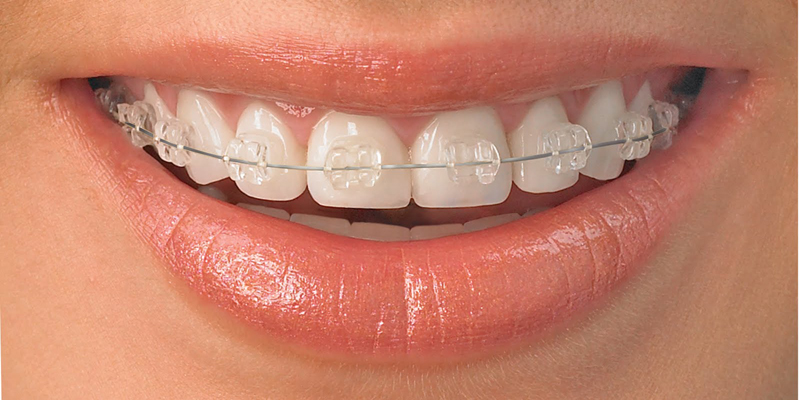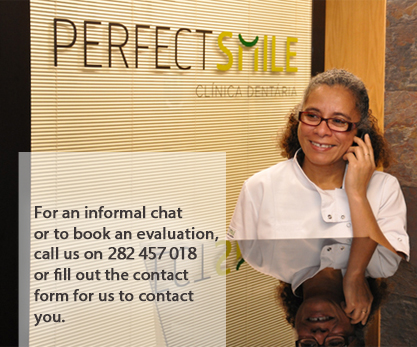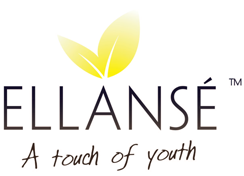 Orthodontics for both Adults and Children
Orthodontics for both Adults and Children
Even if you have had braces before, mild irregularities may have developed due to lack of retainer wear. In this case, a short course of treatment can return them to perfect alignment again. Some patients will also wear braces on the advice of their dentist to preserve or improve their dental health (for example, to improve bite and function and access for cleaning).
As long as your gums and teeth are healthy, there are no real age limits to Orthodontic treatment.
With the increasing choices of modern cosmetic braces, adults are increasingly choosing orthodontic treatment to give them a natural and pleasing dental appearance to enhance their looks and confidence.
At PERFECT SMILE Dental Clinic, we have a keen interest in providing discreet treatment for adults seeking orthodontic treatment. Aside from a range of cosmetic appliances, we also offer invisible braces where no one will have to know you are having treatment.
Orthodontic Benefits
Most people come to our office because they don't like the way their teeth look. The benefits of orthodontic treatment are many and can vary depending on individual needs and expectations. In general, however, the benefits are:
- Once the proper relationship between the teeth has been created, there is less opportunity for food impaction and plaque retention. Brushing and flossing are easier to accomplish and this reduces the incidence of tooth decay and gum (periodontal) disease.
- Prevention of worn teeth, loosening of teeth, breaking of teeth, and jaw (TMJ) discomfort and pain later in life is possible through orthodontic treatment. Orthodontics is, thus, a good investment against future complicated and expensive dental procedures.
- In some instances, speech problems may result from mal-positioned teeth and jaws. This may also be related to habits such as thumb or finger sucking, or to obstructions in the respiratory tract that cause a mouth breathing habit.
- A child or adult who does not chew his food properly because of a poor bite may develop digestive problems and thereby affect the general health of the body over time.
- From a social-psychological standpoint, protrusive and mal-positioned teeth can be detrimental. As one's appearance improves through orthodontic treatment, self-confidence and self-esteem grow.
Common Orthodontic Problems
A malocclusion, or “bad bite”, occurs when the teeth and/or jaw bones do not fit together properly. This may result in speech difficulties, inaccessibility for proper hygiene, premature tooth wear, injury to the teeth and jaw joints, and compromised function and esthetics. Orthodontic treatment may be necessary to straighten teeth and promote ideal health and function. The following is a description of the more common orthodontic problems.
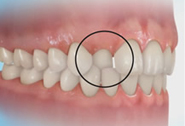 |
Anterior Crossbite One or more of the top front teeth fit inside the bottom teeth, which may lead to misalignment of the growing jaw, strain on the temporomandibular (jaw) joint (TMJ), or accelerated tooth wear. When a crossbite occurs with the front teeth, it is termed an anterior crossbite. |
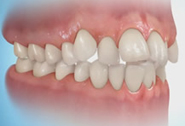 |
Crowding There is insufficient room in the jaws for all of the teeth to erupt through the gums in an ideal position. This results in crooked teeth that are difficult to clean and maintain, and may lead to tooth decay, periodontal or gum disease, and/or tooth loss. |
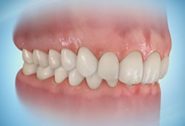 |
Deep Bite (Excessive Overbite) There is excessive vertical overlap between the upper front teeth and the lower front teeth. This may cause premature tooth wear or gingival (gum tissue) inflammation or recession when the lower front teeth bite into the roof of the mouth. |
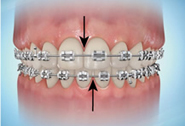 |
Midline Asymmetry If the center of the upper and lower front teeth are not lined up relative to each other, it may be a sign that the back teeth do not fit together properly. |
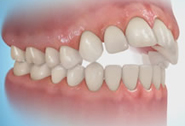 |
Open bite There is no vertical overlap between the upper and lower front teeth (i.e., the front teeth do not touch) when the back teeth are in contact. This may interfere with speech and eating and is likely to cause excessive wear on the back teeth. Individuals with this type of bite often complain of an inability to completely bite through their food, such as a sandwich. This may be a result of thumb sucking, tongue thrusting, or an underlying skeletal (jaw bone) problem. |
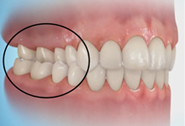 |
Posterior Crossbite One or more of the top back teeth fit inside the bottom teeth, which may lead to misalignment of the growing jaw, strain on the temporomandibular (jaw) joint (TMJ), or accelerated tooth wear. When a crossbite occurs with the back teeth, it is termed a posterior crossbite. |
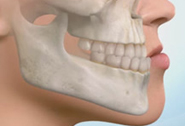 |
Protrusion of Bottom Front Teeth (Negative Overjet) The lower front teeth extend out in front of the upper front teeth. This is due to either the lower front teeth (or lower jaw) being too far forward or the upper front teeth (or upper jaw) being too far back, or a combination of the two. This relationship can lead to abnormal tooth wear and/or jaw joint (TMJ) dysfunction. |
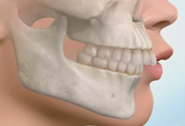 |
Protrusion of Top Front Teeth (Excessive Overjet) There is excessive horizontal overlap between the top and bottom front teeth. Protruded front teeth is due to either the top front teeth (or top jaw) being too far forward or the bottom front teeth (or bottom jaw) being too far back or a combination of the two. In active individuals, particularly children and adolescents, this tooth/jaw relationship can result in tooth fracture or trauma if there is a blow to the front of the mouth. This relationship can also lead to abnormal tooth wear and/or jaw joint (TMJ) dysfunction. |
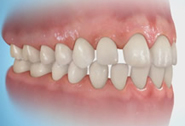 |
Spacing There is space between adjacent teeth, which may be caused by missing or undersized teeth, oversized jaws, or a combination of the two. Spacing of the teeth can lead to food impaction and speech problems. |

